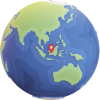Case studies are organised by region, with each region featuring links to the countries where the case studies are located.
Burkina Faso

A report by the United Nations Office on Drugs and Crime details how the illicit gold trade in Burkina Faso has played a critical role in financing conflicts. Artisanal and small-scale gold mining (ASGM), a focal point for the country’s economy, provides resources to non-state armed groups, and contributing to instability in the region. In Burkina Faso, ASGM produced approximately 49.5 tons of gold in 2018, valued at around $2.7 billion in 2022. The artisanal gold mining market is a significant source of income for many communities, but a big portion of this gold is smuggled out of the country, avoiding formal channels and taxation. The revenue derived from this illicit trade is often reinvested in weapons and vehicles, providing increased economic prosperity for armed groups, such as those affiliated with Jama'a Nusrat ul-Islam wa al-Muslimin (JNIM), during conflicts. The influx of weapons into the region, especially after the 2011 Libyan revolution, has made arms readily available to different groups, contributing to the weaponisation of existing trafficking routes. In addition, the smuggling networks also play a role in supplying armed groups with recruits. Migrant smugglers, for instance, liaise with armed groups and pay taxes for safe passage through territories controlled by these groups.
Keywords: Sub-Saharan Africa, Burkina Faso, minerals, gold, primary production, illegal mining, terrorist and conflict financing, tax evasion
Sources: https://www.unodc.org/documents/data-and-analysis/tocta_sahel/TOCTA_Sahel_Transversal_2024.pdf

A report commissioned by the government of Burkina Faso revealed that extremist political groups frequently attacked gold mines in order to access gold as a source of funding. Since 2016, armed extremist groups have accumulated 70 billion CFA francs ($126 million) following attacks on mining sites. These extremists, often linked to Islamic State and al-Qaeda, target gold mines in order to seize control and extort taxes. The central governments' limited control over mining regions leaves communities vulnerable, and struggling to defend themselves from these well-armed groups. Extremist groups not only target gold mines in the aims of conflict financing, but also to supply explosives for terrorist activities. Terrorist groups view the control of gold mines and transport routes as crucial for legitimacy and power over local populations. This control leads to violence as groups compete for profits and dominance. Lastly, the loss of governmental tax revenue from gold smuggling undermines funding for social programs and counter-terrorism efforts.
Keywords: Sub-Saharan Africa, Burkina Faso, minerals, gold, primary production, illegal mining, terrorist and conflict financing, tax evasion
Sources: https://www.state.gov/wp-content/uploads/2021/10/BURKINA-FASO-2020-HUMAN-RIGHTS-REPORT.pdf
https://adf-magazine.com/2023/10/terrorists-target-the-sahels-gold-mines-as-a-source-of-financing/
Democratic Republic of the Congo


A report by Congo in Conversation explains how the production of the charcoal, or "makala", in Congo's North Kivu Province, contributes to an illegal trade. This trade has a significant environmental impact on Virunga National Park. The national park, a UNESCO World Heritage site, suffers from deforestation as a consequence of these activities, since over half the charcoal consumed in nearby Goma is illegally sourced from the park. In addition, the charcoal trade supports criminal networks and contributes to ongoing violence, including clashes between park rangers and armed groups, leading to numerous fatalities. Generating around $35 million annually, the charcoal trade is controlled by armed groups like the Democratic Forces for the Liberation of Rwanda (FDLR), which only exacerbates environmental destruction and local conflicts. The FDLR exploits natural resources, including charcoal, to fund its activities, imposing taxes on loggers and charcoal burners. Despite government acknowledgment of the issue, little action has been taken due to corruption and complicity among officials.
Keywords: Sub-Saharan Africa, The Democratic Republic of Congo, charcoal, primary production, trade and transport, terrorist and conflict financing, organised crime, deforestation
Sources: https://congoinconversation.fondationcarmignac.com/en/reportages/congo-s-charcoal-an-illegal-trade-a-precarious-lifeline-guerchom-ndebo
Mozambique

In Mozambique, illegal mining and associated financial crimes are becoming significant issues, with the mining sector increasingly exploited for money laundering and terrorism financing. Criminals involved in the illicit extraction of resources like gold and gemstones use fraudulent invoices, unregulated trade routes, and complex laundering schemes to legitimise their profits. This activity fuels organised crime and supports extremist groups, notably in conflict-prone areas such as Cabo Delgado.
The UN Office on Drugs and Crime (UNODC) is actively working to counter these trends in Mozambique. Efforts include training local law enforcement and financial institutions to identify and combat illicit financial flows linked to mining. The UNODC promotes regional cooperation to bolster regulatory frameworks and improve intelligence sharing. These measures aim to curtail the illegal exploitation of Mozambique's rich mineral resources, disrupt criminal networks, and ensure that the benefits of mining contribute to sustainable development and economic stability.
Keywords: Sub-Saharan Africa, Mozambique, minerals, gold, primary production, trade and transport money laundering, terrorist and conflict financing, fraudulent documentation, organised crime
Source: https://www.unodc.org/rosaf/en/stories/2023/December/tackling-money-laundering-and-the-financing-of-terrorism-related-to-crimes-in-the-mining-sector.html
Myanmar

In southeastern Myanmar, rubber production has been linked with conflict financing, according to a 2020 report by Forest Policy Trade and Finance Initiative. Particularly in the Tanintharyi Region, rubber has been used to finance long-standing ethnic conflicts involving various rebel groups and the national military (the Tatmadaw). Indeed, Mon businessmen, who are often the former commanders of the Mon National Liberation Army (MNLA), the armed wing of the New Mon State Party (NMSP), have used their connections to establish rubber plantations in northern Tanintharyi. The expansion of rubber plantations by these businessmen, backed by the NMSP, effectively finances the rebel group by providing economic resources and territorial control. The establishment of rubber plantations on lands designated as ‘wastelands’ or ‘vacant lands’ by the government allows Mon businessmen to gain official land use rights. However, this process disenfranchises Karen communities, who previously inhabited these lands before being displaced by the Tatmadaw, and finances the ongoing conflict.
Keywords: South East Asia & Pacific, Myanmar, rubber, primary production, terrorist and conflict financing
Sources: https://www.forest-trends.org/wp-content/uploads/2020/07/MN_Conflict_Rubber_FINAL-1.pdf
Nigeria

The article titled “INVESTIGATION: Inside illegal mining operations of notorious Nigerian terrorist” published on Premium Times, provides an in-depth look into the illegal mining operations run by Halilu Sububu, a notorious terrorist in Nigeria’s North-west region. Sububu, a former gunrunner who mentored several other terrorists, has established a thriving illegal gold mining operation in the solid mineral-rich Bagega and other communities around Sumke forest in Anka Local Government Area of Zamfara State. Sububu’s gang routinely abducts villagers who are compelled to work at the mines. The involvement of terrorists in illegal mining is not new, but Sububu and his gangs have taken over the running of the mines from the locals who are now forced to work for them usually without pay. The article suggests that terrorists like Sububu have diversified into mining to continue financing their terrorism activities.
Keywords: Sub-Saharan Africa, Nigeria, minerals, primary production, illegal mining, terrorist and conflict financing
Source: https://www.premiumtimesng.com/news/653658-investigation-inside-illegal-mining-operations-of-notorious-nigerian-terrorist.html?tztc=1
Somalia

According to the Horn Observer, the increasing artisanal gold mining in the Golis mountains of northeastern Somalia has become a significant target for taxation by militant groups Al Shabaab and Islamic State. The village of Milxo is notably at the centre of this activity. Gold mining in Milxo involves two main practices, surface mining and deep cast mining. Both lack proper permits and safety measures, leading to frequent accidents. The gold mining operations produce an estimated 300 kg of gold annually, worth about $1.5 million, which is mostly smuggled to the UAE to avoid taxes. Al Shabaab has aggressively campaigned to control this lucrative trade, imposing a taxation scheme on miners and buyers, despite the presence of Puntland and international counterterrorism forces. The group's ability to leverage the rough terrain, financial constraints of local governments, and unregulated mining activities enhances their operational capabilities. This poses a threat to international stability and maritime traffic. The ongoing conflict and lack of effective governance in the area have overall allowed Al Shabaab to exploit the gold trade, funding their insurgency.
Keywords: Sub-Saharan Africa, Somalia, minerals, gold, primary production, trade and transport, terrorist and conflict financing, rule of law
Sources: https://hornobserver.com/articles/1822/Getting-a-grip-on-Somalias-Gold-rush

Charcoal is the most important energy source in Somalia, relied upon by 98% of all households in towns and cities for heating and cooking. A recent investigation by CORRECTIV indicates that the charcoal trade contributes to the large-scale deforestation of acacia forests, which is concentrated in the regions of Jubaland, Lower Shabelle and Bay. The situation is particularly grave in Bay, where the trade is rapidly accelerating soil erosion and desertification - fueling drought and starvation among the local population.
In addition to causing environmental degradation, the charcoal trade constitutes a significant source of terrorist financing. Large parts of the charcoal trade are under the control of jihadist organisation, Al-Shabaab, which uses the multi-million-dollar revenue generated by this trade to wage war on the Somali government, perpetuating regional instability and violence. As well as being victims to Al-Shabaab’s brutality, local people are also vulnerable to illicit taxation and extortion by this group. The charcoal trade is also connected to money-laundering, with profits from the illegal charcoal trade being laundered to conceal their illicit origins. Although the production of charcoal and its trade for export was outlawed by the Somali government in 2012, CORRECTIV’s investigation uncovers state corruption and complicity in the industry. Large charcoal production facilities are located in government controlled-areas and Somali officials, across various levels, benefit from this trade through the taking of bribes. The Somali army, for example, demands its own ‘tax’, in exchange for turning a blind eye to the transport of this resource in government-controlled territory from areas under Al-Shabaab-control.
Keywords: Sub-Saharan Africa, Somalia, timber, charcoal, primary production, trade and transport, terrorist and conflict financing, corruption and bribery, extortion, money laundering
Source: https://correctiv.org/en/latest-stories/2023/01/16/charcoal-somalias-burning-issue/
The Central African Republic (CAR)

A Global Witness investigation revealed how illicit practices in the Central African Republic (CAR) timber industry has helped finance conflict in the country. According to the investigation, logging companies have paid millions of euros to armed groups to ensure that they can continue operating in the country, with companies continuing to offer CAR timber for sale on international markets. One of the country’s leading timber exporters, SEFCA, was accused of paying significant sums of money to armed groups in the country, including a €381,000 payment to the Seleka, an alliance of rebel militia groups accused of numerous human rights violations.
Keywords: Sub-Saharan Africa, Central African Republic, timber, primary production, illegal logging, terrorist and conflict financing, human rights violations
Source: https://www.globalwitness.org/en/archive/company-accused-financing-central-african-war-invited-eu-logging-conference/

In the Central African Republic (CAR), Russia’s involvement in the mining sector is a key strategy maintained to evade sanctions, allowing both economic and geopolitical advancement. The Wagner Group, a paramilitary organisation with close ties to the Kremlin, plays a crucial role in this process. By securing profitable mining contracts, notably in the gold and diamond industry, Wagner circumvents Western financial sanctions imposed due to Russia’s internationally condemned military actions in Ukraine. In the CAR, Wagner’s operations go beyond traditional economic interests, with security concerns also being prominent. Companies such as Finans M and Lobaye Invest, reportedly controlled by Wagner's leader, exploit mineral resources in the Central African Republic (CAR) under the guise of economic activity, reinforcing Russia’s geopolitical presence. These entities facilitate the trade of precious minerals outside the formal banking system, enabling Russia to bypass sanctions. This strategy allows Russia to leverage CAR's rich minerals to sustain its economy and finance military activities in Ukraine. It is also crucial to note that Russian mining activity in the CAR is causing environmental damage, including land degradation, deforestation, and water pollution, due to a lack of regulation. If Russia's involvement in CAR succeeds, similar unregulated mining projects could spread throughout the sub-Saharan region, increasing environmental harm.
Keywords: Sub-Saharan Africa, Central African Republic, minerals, gold, diamond, illegal mining, sanctions evasion, terrorist and conflict financing, deforestation
Source: https://ecomnewsafrique.com/en/2023/05/12/africa-russias-growing-involvement-in-the-african-mining-sector-is-an-important-instrument-of-geopolitical-influence-and-a-means-to-circumvent-western-economic-and-financial-sanctions/
https://www.tearline.mil/public_page/car-mines


The Environmental Crimes Financial Toolkit is developed by WWF and Themis, with support from the Climate Solutions Partnership (CSP). The CSP is a philanthropic collaboration between HSBC, WRI and WWF, with a global network of local partners, aiming at scaling up innovative nature-based solutions, and supporting the transition of the energy sector to renewables in Asia, by combining our resources, knowledge, and insight.


